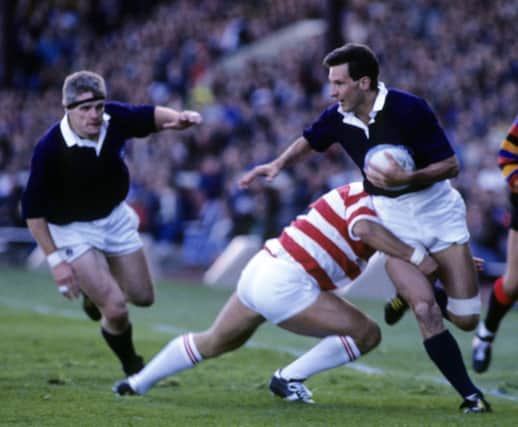Scottish Rugby has always relied on incomers but would a home-grown XV beat a team of adopted Scots?


On the face of it, our professional rugby isn’t in a bad way. The World Cup was disappointing, partly thanks to the ridiculously early determination of the pools, partly because we would have liked, and indeed expected, the games against South Africa and Ireland to have been much closer than they were. But the fact remains that Scotland haven’t lost to any lower-ranked nation for some time, and have also played skilful, exciting and satisfying rugby.
Meanwhile, Edinburgh and Glasgow have both started the United Rugby Championship season well. They had good wins last week against Connacht and the Ospreys respectively; Edinburgh at home, Glasgow away. Both matches were close and won with some character, even though in both games the defeated sides played the more ambitious and entertaining rugby.
Advertisement
Hide AdAdvertisement
Hide AdSome of us, however – those of the glass-half-empty persuasion – wonder gloomily if what we have now is as good as it will get for some years to come. This is partly because our recent record in age-group internationals has been poor, very poor indeed, and there doesn’t seem to be much talent coming through.
Others point to the number of Scottish international players who were either born elsewhere or who were developed elsewhere, players therefore for whose development the SRU can take little or indeed no credit.
To some extent, of course, it’s aye been like that. There have always been players capped by Scotland for whom Scotland was a scarcely known land until they wore the dark blue jersey.
A hundred years ago Scotland were captained by the Harlequins centre A L Gracie of whom this was said, though he protested that he had spent school holidays with his granny in, I think, Rothesay. Then we remember New Zealander Sean Lineen’s contribution to the 1990 Grand Slam and fellow Kiwis like the Leslie brothers and that grand lock Nathan Hines from Wagga-Wagga.
Of course, other countries are not so different in this respect. We may marvel at Ireland’s assembly line of talent and gaze jealously at their development riches. Fair enough, yet four of Ireland’s fine back division were neither born nor reared in the Emerald Island: Mack Hansen, Bundee Aki, James Lowe and Jamison Gibson-Park.
Nevertheless, brooding on this question, it occurs to me that you might now be able to stage something like the old Final Trial of the amateur days between a homeborn-and-bred XV and another composed of Scotland players born or developed elsewhere.
Something like this perhaps...
Blues: Blair Kinghorn, Darcy Graham, Mark Bennett, Stafford McDowall, Ollie Smith, Finn Russell, George Horne; Rory Sutherland, Dave Cherry, Zander Fagerson, Richie Gray, Grant Gilchrist, Jamie Richie, Matt Fagerson, Rory Darge.
Not at all a bad team. But would it beat this one?
Whites: Huw Jones, Kyle Steyn, Chris Harris (or Cameron Redpath), Sione Tuipulotu, Duhan van der Merwe, Ben Healy, Ben White (or Ali Price); Pierre Schoeman, Ewan Ashman, WP Nel, Cameron Henderson, San Skinner, Andy Christie, Jack Dempsey, Hamish Watson.
Advertisement
Hide AdAdvertisement
Hide AdSurprisingly our capped locks are almost all home-grown, with Jonny Gray and Scott Cummings rivalling the elder Gray and Gilchrist. Moreover, a number of this second team played age-group rugby for Scotland and Watson and Price, for example, have played all their professional club rugby for Edinburgh or Glasgow.
Then there are other capped players who were reared mostly this side of the English border and played professional club rugby here first: Adam Hastings and Magnus Bradbury, for instance.
One might certainly argue that some of those in the Whites team have improved considerably since coming to play their club rugby here. Then some of those who have failed to shine may be potentially very good players suffering from playing in a weak team.
Then there are always some late developers, though none may match the great French prop Alfred Roques of long ago. He played no rugby till he was 27, was first capped at 33 and held his place in the French team till he was 38. A farmer, he was often snapped by press photographers scrummaging against a Charolais bullock.
Comments
Want to join the conversation? Please or to comment on this article.